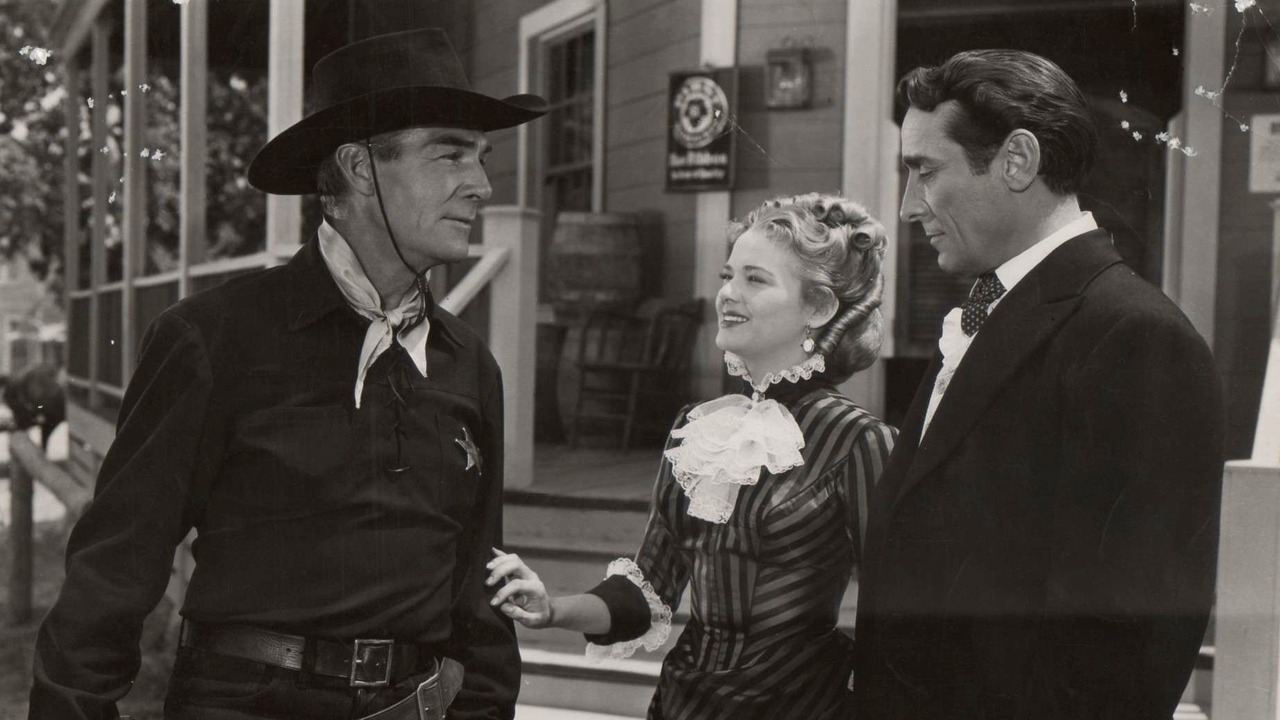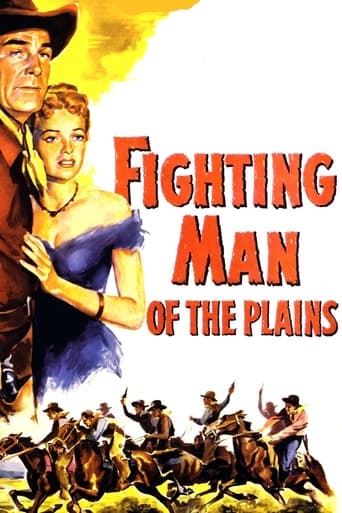

Randolph Scott plays Jim Dancer, a man in search of revenge for the murder of his brother. He rides with the Quantrell gang and after killing Evelyn Slocom's ( Joan Taylor ) father, believing he was the killer of his brother, Dancer now finds himself a wanted man. Years pass and he is now the Marshall of a Kansas town where he defeats another violent gang with the help of a young Jesse James ( Dale Robertson ). Randolph Scott and director Edwin L. Marin bring about an exceptional gripping atmospheric western. With a balanced amount of storyline complexity, a surprisingly powerful violent opening scene for the time and plenty of excellent elements of surprise, leaving the viewer wondering how it will all come to a climax. Also, the dark cinematography gives towering Randolph Scott an imposing quality, perfect for his character. Fighting Man of the Plains may very well be one of his best westerns to close out the 1940s. With a superb line up of excellent character actors along with the young Dale Robertson, this western hold ups extremely well. A full synopsis would only give away too much watching enjoyment for the reader. If you are a fan of Randolph Scott and western genre, I highly recommend giving " Fighting Man of the Plains " a look.
... View MoreDirected by Edwin L. Marin and written by Frank Gruber, Fighting Man of the Plains stars Randolph Scott, Victor Jory and Jane Nigh. Music is by Paul Sawtell and cinematography by Fred Jackman Jr.A solid and sturdy Marin and Scott Oater that finds Scott as an ex Quantrill raider assuming the identity of a dead detective in a post Civil War Lanyard, Kansas. Proving himself as a fellow made of stern stuff, he's quickly appointed Marshal and begins to clean up the town, but his past is sure to catch up with him...Without breaking any new ground this still manages to get the key ingredients right in the name of entertainment. The script is sharp, the performances equally so (Jory is excellent), and Marin being the good old pro that he was, pushes things along at a good clip.There's a lot going on in Lanyard, with various underhand plottings and a few vengeful motivations. While of course there's some simmering passion waiting to explode. The many key characterisations are richly born out, the action healthy, and there's even a couple of surprises along the way to keep the plotting interesting.A couple of errors out there in the intranet universe need correcting. Some have it that Dale Robertson as Jesse James plays a big part in the cleaning up of Lanyard (yes Jesse is kind of a good bad guy here), but he doesn't as he's barely in it, but he does have a key scene to play in pics finale. So fans of Robertson, in what is believed to be his first credited role, should take that on board.Secondly. I read a review that states Jory's Dave Oldham character is one of the shifty villains of the piece! He really isn't, he's firmly a friend and ally to Jim Dancer (AKA: Marshal Cummings), and it is he who is the one helping to clean up Lanyard. Another thing of note, filmed in Cinecolor, there seems to only be black and white prints of the movie available to view? Which is actually OK as the print I saw had that late 40s noirish vibe to the photography, but you would like to have the option of seeing the colour print for sure. 7/10
... View MoreThis film would probably not come out with honors if reviewed by a harsh critic. They would find flaws in the psychological motivations of the main characters, and at certain moments the simplicity of a comic book style of narration where the characters ostensibly explain what the screen cannot show. But there is another dimension to a western where other factors are what count. This film grabs you from the beginning and involves you up to the end, pure excitement, fast moving, there is Quantrill, Jesse James, and the hero, Jim Dancer (Randolph Scott) who used to ride with them taking part on the massacre in Lawrence, Kansas. By a series of circumstances he ends up sheriff of a town, but it is only a question of time before people will find out who he really is. There is a great ending and an excellent Dale Robertson as Jesse James on a very small part. If you think you saw all the best Scott movies, you will have a good surprise when you see this one, and it is hard to believe, it was made in 1949!
... View MoreRenowned western novelist Frank Gruber wrote the script of FIGHTING MAN OF THE PLAINS (1949) based on his own book. It tells the story of Jim Dancer (Randolph Scott), a fugitive outlaw who'd been part of Captain William Quantrill's infamous raid on Lawrence, Kansas on August 21, 1863. Dancer is apprehended by a "Pleasanton" (read: Pinkerton) detective who is then killed in an accident, allowing Dancer to take his identity and wind up in Lanyard, Kansas, where he's pressured into taking the job of Marshal after fearlessly subduing some rowdy cowboys. It's a fairly corrupt town, but the new Marshal does a good job of keeping the peace and gets aid from some unexpected quarters at the local gambling hall. The script is awash in simmering undercurrents, including the fact that the man who owns the town, Slocum (Barry Kelley), had killed Dancer's brother during the war, and Dancer had killed Slocum's brother in response during the Lawrence raid. Slocum's niece (Joan Taylor), who'd witnessed the killing of her father a decade earlier, lives with her uncle but fails to recognize Dancer as the culprit and begins to fall for him. Meanwhile the gambling saloon owner, Oldham (Victor Jory), finds his voluptuous partner, Florence (Jane Nigh), falling for Dancer as well. Eventually, Slocum alienates both the local cattlemen and the railroad company through his efforts to control all the land around town and a showdown is inevitable. At one point, a detective from Chicago shows up, summoned by the suspicious Slocum, to see if "Marshal Cummings" (Dancer's new identity), is indeed his old detective buddy. To make matters worse, Slocum's got cocky young gunslinger Johnny Tancred (Bill Williams) in his pocket, ready to take over when the tide turns. Dancer has his own ace in the hole, however, thanks to his old wartime associations. The finale offers a clear violation of the Production Code, but I can see where the blurred lines between good and bad, lawman and lawbreaker, "respectable" and disreputable could have easily confused the censors. Lots of stuff happens in the movie and the cast of characters is quite colorful. Things never slow down and surprises come at us pretty quickly. I had a great time watching this. I never felt it getting too far-fetched for me. The cast includes plenty of old hands at this kind of thing (Scott, Jory, Paul Fix, Douglas Kennedy) and a few new hands (Taylor, Nigh, Williams) and they're all good. Jory is particularly awesome. He comes off initially as his patented oily gambler, but he proudly defies our expectations. Future western star Dale Robertson appears as Jesse James in his first credited role. He has only two scenes—one good one and one great one. Film noir regulars Barry Kelley and Berry Kroeger are both on hand, one as a bad guy and one who'll surprise you.I watched this on TCM, which showed a black-and-white print of a Cinecolor film. I hope someone finds a color print and releases it on DVD.
... View More